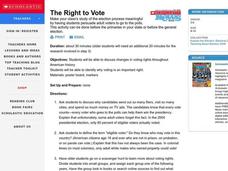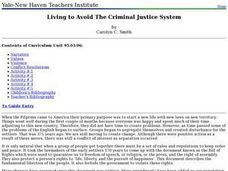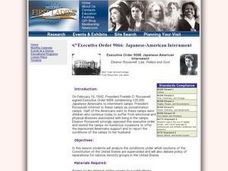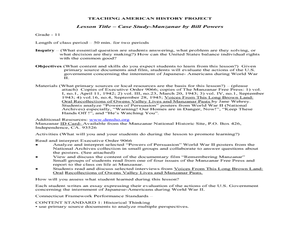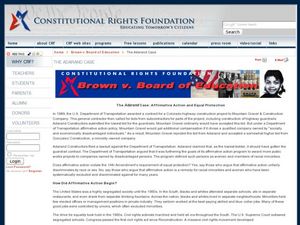Curated OER
Outsourcing Jobs to Other Countries: Is Globalization a Threat to American Workers?
Young scholars analyze the effects of outsourcing. For this globalization lesson, students listen to their instructor present a lecture regarding the outsourcing of American jobs to other countries. Young scholars respond to discussion...
Constitutional Rights Foundation
The Election of 1912
The Election of 1912: an election with four competitive opponents. Pupils get to know the candidates with informative reading passages that provide context to the election. Then, the class engages in a debate and answers questions as one...
C-SPAN
Presidential Birth Requirement
Every president of the United States must be a natural-born citizen, but the definition of natural-born is not as straightforward as it seems. Secondary scholars examine two points of view surrounding the constitutional requirement and...
Curated OER
The Homefront: America and WWII
Students are introduced to the experiences of various groups of Americans at home during WWII, highlighting race, gender, and ethnicity. They improve their ability to analyze and interpret historical documents and images.
Curated OER
Roots of the Documents of Freedom
Learners examine and analyze various excerpts from documents of freedom such as Magna Carta and Virginia Declaration of Rights, identify how documents influenced each other, and discuss ideas and rights necessary to build representative...
Curated OER
Fairy Tails Can Show Due:It can happen for you, If you play your part.,
Learners view a Reader's Theater focusing on the story of Goldilocks and the Three Bears. The story is used as a springboard into a videotaped mock trial of Gold E. Locks developed by the American Board of Trial Advocates (ABOTA). They...
Curated OER
In His Own Words: James Madison On the Problem of Faction
Students are introduced to the writings of James Madison and explain why he is often called "The Father of the Constitution". Using primary source documents, they examine his view of the Bill of Rights and what he meant by faction. In...
Curated OER
The Right to Vote
In this voting worksheet, students identify and discuss changes in voting rights throughout American history.
Then, they identify why voting is an important right for Americans. Finally, students create voting bookmarks instead of or in...
Curated OER
The Road to Democracy
Eleventh graders examine the road to the American Revolution. In this American Revolution lesson, 11th graders read Thomas Paine's works and identify the issues that the colonists had with the British government.
Curated OER
Living to Avoid The Criminal Justice System
Students brainstorm a list of negative stereotypes in the African-American society. In groups, they develop ways to decrease the chance of them living in poverty and being in trouble with the law. They develop ways to solve problems...
Curated OER
The Embodied Presidency
Eighth graders discover details about Thomas Jefferson's life. In this early American history instructional activity, 8th graders view a PowerPoint presentation that outlines some aspects of Jefferson's life. Students research the life...
Albert Shanker Institute
Economic Causes of the March on Washington
Money can't buy happiness, but it can put food on the table and pay the bills. The first of a five-lesson unit teaches pupils about the unemployment rate in 1963 and its relationship with the March on Washington. They learn how to create...
Judicial Learning Center
The Constitution
Supreme Court justices debate the meaning of the US Constitution, but we expect teachers to explain it to scholars with far less training and experience. A daunting task for sure, but it's not insurmountable with resources that simplify...
Curated OER
Money Talks
Students examine paper money from the time of the American Revolution. They use the issue dates of the bills to construct a chronology of political changes during the Revolution.
Curated OER
The Development of Antitrust Enforcement
Students analyze antitrust enforcement. In this American economics lesson plan, students listen to their instructor present a lecture regarding the details of the free market system and antitrust laws. Students respond to discussion...
National First Ladies' Library
Executive Order 9066: Japanese-American Internment
Students analyze conditions under which sections of United States Constitution are superceded, research history of Native Americans, African Americans, and Japanese Americans, and debate policy of reparations for various minority groups...
Curated OER
Mystery, Myth, and Wonder: The White Elephant
Young scholars examine the role of the elephant in the culture of Thailand through many different class activities based on a PBS program "The White Elephants of Thailand with Meg Ryan". Students also look at the impact of technology on...
Curated OER
Case Study: Manzanar
Eleventh graders investigate Japanese-American internment. In this World War II lesson plan, 11th graders conduct research from the Manzanar National Historic Sites and then write essays based on their findings.
National Endowment for the Humanities
Magna Carta: Cornerstone of the U.S. Constitution
High schoolers use the Internet to read a brief description of Magna Carta (link provided). They "walk through" the document with the teacher, identifying four major themes. High schoolers read and discuss "The Rhetoric of Rights:...
Judicial Branch of California
Separate But Equal - Is It Black or White?
The story of Ruby Bridges and the case of Brown vs. The Board of Education are fantastic tools for discussing the concept of separate but equal. Kids tackle some big questions about what is fair, what is civil, and what rights or laws...
Constitutional Rights Foundation
Plyler v. Doe: Can States Deny Public Benefits to Illegal Immigrants?
Illegal immigration is an ever-changing source of consistent controversy. A reading passage about the rights of undocumented workers and illegal immigrants—and the lack thereof—guides high schoolers into a mock trial activity. Three...
Curated OER
Teaching With Documents: U.S. Constitution Workshop
What does it mean to be American? Explore the constitution and what it really means to be a citizen here. First, learners of all ages will investigate different primary source documents. Then, they establish each document's...
Curated OER
The Adarand Case: Affirmative Action and Equal Protection
Eleventh graders examine the Adarand case. In this American Government lesson, 11th graders create a list of reasons for each affirmative action program. Students develop a defense on certain issues and present it to the class.
Curated OER
A Time for Justice
Young scholars explain the protections and privileges of individuals and groups in the United States.









